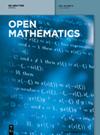Infinitely many solutions for Schrödinger equations with Hardy potential and Berestycki-Lions conditions
IF 0.9
4区 数学
Q1 MATHEMATICS
引用次数: 0
Abstract
In this article, we investigate the following Schrödinger equation:具有哈代势和贝里切基-狮子条件的薛定谔方程的无限多解
本文将研究以下薛定谔方程: - Δ u - μ ∣ x ∣ 2 u = g ( u ) in R N , -\Delta u-\frac\{mu }{{| x| }^{2}}u=g\left(u)\hspace{1em}{\rm{in}}\hspace{0.33em}{{mathbb{R}}}^{N},其中 N ≥ 3 N\ge 3 ,μ ∣ x∣ 2 \frac{\mu }{{| x| }^{2}}称为哈代势,g g 满足贝里切基-狮子条件。如果 0 < μ < ( N - 2 ) 2 4 0\lt \mu \lt \frac\{left(N-2)}^{2}}{4} ,我们将取对称的山形。 我们将采用对称山口法来证明这个问题存在无穷多个解。
本文章由计算机程序翻译,如有差异,请以英文原文为准。
求助全文
约1分钟内获得全文
求助全文
来源期刊

Open Mathematics
MATHEMATICS-
CiteScore
2.40
自引率
5.90%
发文量
67
审稿时长
16 weeks
期刊介绍:
Open Mathematics - formerly Central European Journal of Mathematics
Open Mathematics is a fully peer-reviewed, open access, electronic journal that publishes significant, original and relevant works in all areas of mathematics. The journal provides the readers with free, instant, and permanent access to all content worldwide; and the authors with extensive promotion of published articles, long-time preservation, language-correction services, no space constraints and immediate publication.
Open Mathematics is listed in Thomson Reuters - Current Contents/Physical, Chemical and Earth Sciences. Our standard policy requires each paper to be reviewed by at least two Referees and the peer-review process is single-blind.
Aims and Scope
The journal aims at presenting high-impact and relevant research on topics across the full span of mathematics. Coverage includes:
 求助内容:
求助内容: 应助结果提醒方式:
应助结果提醒方式:


